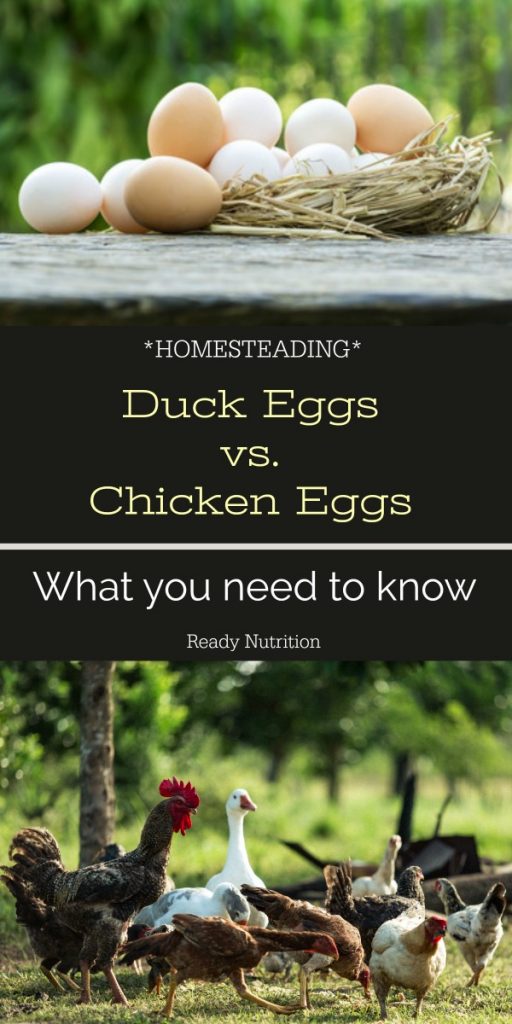Chicken eggs and duck eggs are different. This article won’t say one is better than the other, yet will celebrate the differences that should be noticed and how to alter your recipes if you do choose to use duck eggs instead.
Chicken eggs are the most consumed eggs all around the entire globe. They are good, they are healthy, and they are often very easy to cook. But some people, out of curiosity, nutritional reasons, or even allergies might be interested in trying some other type of eggs, like duck eggs, and will want to know the differences between the two types of eggs.
PHYSICAL DIFFERENCES
The main and obvious differences between duck and chicken eggs are the physical qualities of the egg itself. The size, for one, is apparent. Duck eggs are larger than chicken eggs by about 50%. A more accurate comparison is that 3 chicken eggs are equivalent to two duck eggs. Duck eggs also have a thicker shell that’s harder to crack than chicken eggs do. This thicker shell tends to give duck eggs the slight edge when it comes to shelf life. A duck egg will store a few weeks longer than a chicken egg just because the shell is slightly thicker. However, that can also be considered a con, as duck eggs are harder to crack and get into to use for baking or cooking. You will need some practice to avoid getting eggshells in your food.
A duck egg also has a higher yolk to white ratio. Which changes the nutritional content of the egg.
NUTRITIONAL DIFFERENCES
Duck eggs have a higher fat content than chicken eggs, containing 9.6 grams of fat, compared to 5 grams of fat in chicken eggs. Duck eggs are also higher in Omega-3 fatty acids, They have 71.4 milligrams compared to the 37 milligrams of Omega-3 fatty acids in chicken eggs. They are perfect for those on a Keto diet, but so are chicken eggs.
Because of the larger yolk to the white ratio in duck eggs, they have a higher protein content than chicken eggs too. This is good news for everyone on a high protein diet, such as the Paleo Diet. An average chicken egg contains 6.28 grams of protein, while an average duck egg contains 8.97 grams of protein.
A duck egg is also higher in calories, which makes sense, considering it’s a bigger egg. A chicken egg averages 71 calories, but a duck egg averages 130 calories. These calories come from a higher mix of proteins, fats, and carbohydrates.
Each duck egg contains 619 milligrams of cholesterol, which is more than twice the daily recommended limit. If you have high cholesterol or heart disease, one duck egg has more than 3 times the daily recommended limit, whereas chicken eggs have 187 milligrams of cholesterol.
Duck eggs also contain more albumen than chicken eggs.
BAKING DIFFERENCES
The higher albumen content in duck eggs is a big bonus when it comes to baking with eggs. More albumen gives your pastries and other baked goods more structure and a higher lift. Cakes and other pastries come out fluffier and lighter than with chicken eggs.
Duck egg whites are also a bit harder to whip up than chicken egg whites. This is because they have lower water content. This can also make them a little more rubbery when cooked too long.
TASTE DIFFERENCES
When raised on the same food source, ducks and chickens will produce eggs that have similar taste, although it won’t be exact. Duck eggs will still taste a little richer and heartier due to the higher fat and protein content in them. Ducks prefer a high protein diet over plant matter (think bugs, snails, and slugs). My ducks have been dining on earthworms since fall started and the rain has been nonstop. They love to forage for these things as food. But this will change the taste of the duck eggs making them different than if the ducks were fed solely poultry feed like chickens.
COST DIFFERENCES
Duck eggs are more expensive than chicken eggs on the market. Duck eggs can cost up to $1 per egg, while chicken eggs average around 25 cents each. However, if you raise both ducks and chickens on your own, they actually cost very similar. Duck eggs cost more, in part, because of the economic law of supply and demand. Duck eggs just aren’t mass-produced like chicken eggs are.
The bottom line is that there are pros and cons to both eggs. Maybe some people can look to the duck eggs to fill gaps in their diet and maybe others cannot be bothered to even try them. Either way, these are the differences between duck eggs and chicken eggs, and instead of pretending one is better than the other, we could simply celebrate the differences between them and make the right changes for our families.


One duck egg along with some toast, bacon, and coffee can get you through most of the day until supper time if need be.
Very informative….thanks!
We raise both ducks and chickens, they get the same food and graze the yard together, so taste wise it’s hard to tell them apart.
We sell our chicken and duck eggs for the same price and yes without artificial lights eggs are a seasonable item.
Thanks for a great article ????